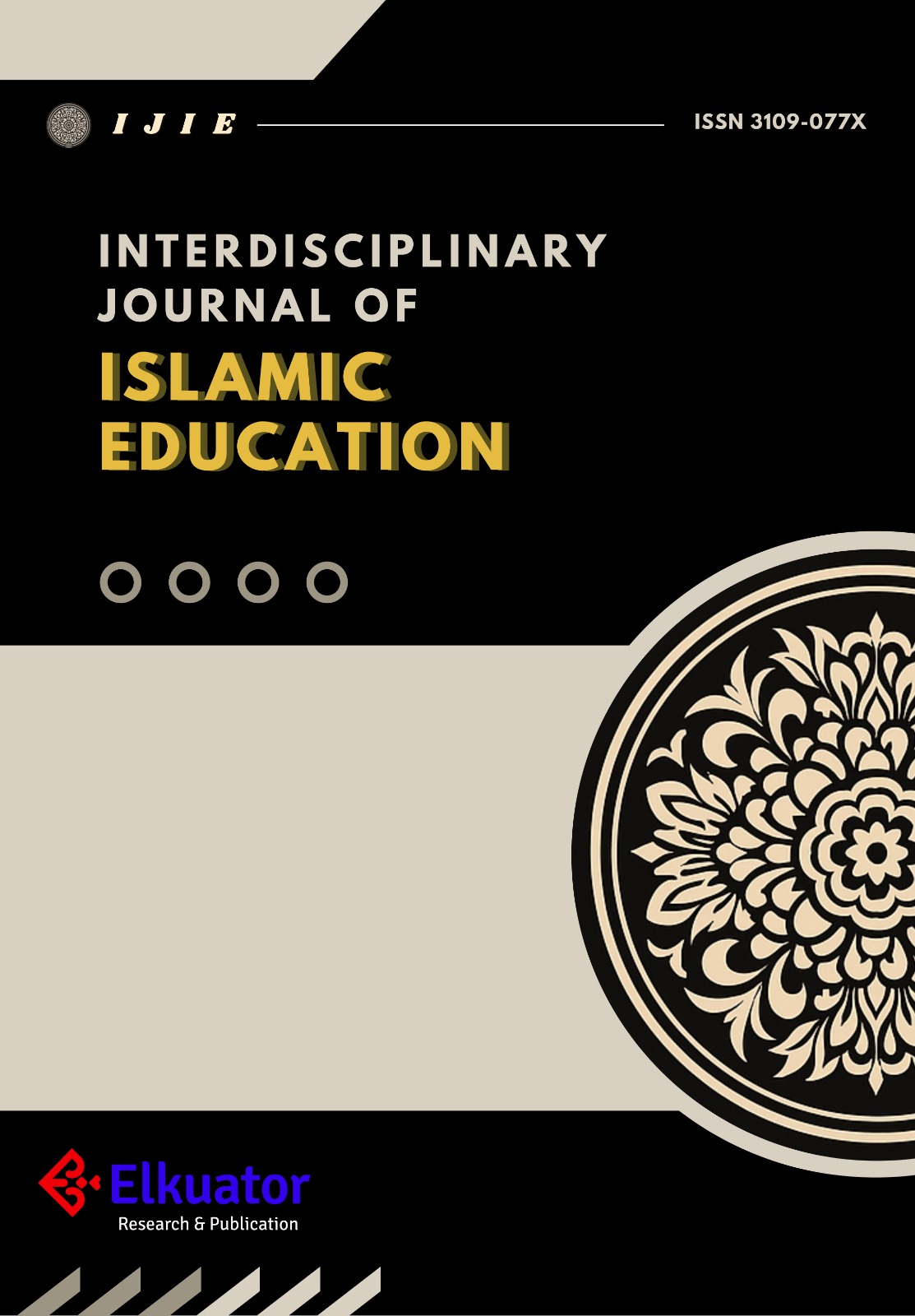From Social Solidarity to Transactional Relations: The Transformation of the Ompangan Tradition in Marriage Celebrations Among the Madurese Muslim Community in Kubu Raya
DOI:
https://doi.org/10.24260/ijssls.1.1.23Keywords:
Madurese Muslim Community, Marriage Celebration, Ompangan Tradition, Social Solidarity, Transactional RelationshipsAbstract
The practice of gift-giving during marriage celebrations has long served as an expression of social solidarity deeply embedded within the Madurese Muslim community. However, evolving social, economic, and cultural dynamics have driven a significant shift in the values underpinning this practice, particularly in the context of the ompangan tradition. Critical studies examining the transformation of this tradition—from a voluntary act of giving to a reciprocal obligation accompanied by social sanctions—remain scarce. This article seeks to address this gap by exploring the shifting values within the ompangan tradition among the Madurese Muslim community in Sui Kakap Subdistrict through empirical research employing a socio-legal approach. Data collection was conducted through participant observation and structured interviews with seven key informants. The findings indicate that the ompangan tradition has undergone a transformation from an affective and tradition-based social act into one characterized by rational-instrumental actions. This transformation is marked by systematic record-keeping, rigid expectations of repayment, and the imposition of social sanctions through stigmatization. Normatively, the practice of ompangan has shifted from being understood as a hibah (gift) to resembling a qarḍ (loan) due to the community’s heightened expectations of repayment. The article argues that the process of adatisation of transactional norms, which blurs the boundaries between social solidarity and economic relations, carries significant implications for the intensification of social inequalities and symbolic segregation within the community. Consequently, this study recommends strengthening customary law frameworks that are more adaptive and participatory to redirect the transformation of ompangan practices toward the principles of mutual assistance in line with the objectives of Islamic law (maqāṣid al-sharī‘ah) within the context of Islamic marriage celebrations.
[Tradisi pemberian hadiah dalam perayaan pernikahan merupakan ekspresi solidaritas sosial yang telah mengakar dalam komunitas Muslim Madura. Namun, dinamika sosial, ekonomi, dan budaya yang berkembang telah mendorong pergeseran nilai dalam praktik tersebut, khususnya dalam tradisi ompangan. Kajian kritis yang menelaah transformasi makna dari pemberian sukarela menjadi kewajiban timbal balik yang disertai sanksi sosial masih sangat terbatas. Artikel ini bertujuan mengisi kekosongan tersebut dengan menelaah pergeseran nilai dalam tradisi ompangan di komunitas Muslim Madura di Kecamatan Sui Kakap, melalui penelitian lapangan dengan pendekatan sosio-legal. Pengumpulan data dilakukan melalui observasi partisipatif dan wawancara terstruktur dengan tujuh informan kunci. Temuan menunjukkan bahwa tradisi ompangan telah mengalami transformasi dari tindakan sosial berbasis nilai afektif dan tradisional menjadi tindakan yang lebih rasional-instrumental, ditandai dengan pencatatan sistematis, kewajiban pengembalian yang rigid, serta pemberlakuan sanksi sosial berbasis stigma. Secara normatif, tradisi ompangan bergeser dari akad hibah (pemberian) menjadi akad qarḍ (hutang-piutang) akibat ekspektasi pengembalian yang menguat di masyarakat. Artikel ini berargumentasi bahwa proses adatisasi norma transaksional yang mengaburkan batas antara solidaritas sosial dan relasi ekonomi berimplikasi terhadap penguatan potensi ketimpangan sosial dan segregasi simbolik dalam komunitas. Oleh karena itu, studi ini merekomendasikan penguatan hukum adat yang lebih adaptif dan partisipatif agar transformasi tradisi ompangan dapat diarahkan kembali pada prinsip tolong-menolong yang sesuai dengan tujuan hukum Islam (maqāṣid al-sharī‘ah) dalam perayaan perkawinan Islam.]
References
Al-Zuḥailī, Wahbah. Al-Fiqh al-Islamī wa Adillatuh. Vol. 7. 8 vols. Damaskus: Dār Al-Fikr, 1985.
Amirkhanova, Aida K., and Aminat A. Bayramkulova. “Wedding Gift Exchange Among the Peoples of Dagestan: Traditions and Innovations.” History, Archeology and Ethnography of the Caucasus 15, no. 4 (January 6, 2020): 783–99. https://doi.org/10.32653/CH154783-799.
Barsukova, Svetlana. “Bank Loans vs Debt within Social Networks: The Case of Central Asia.” Terra Economicus 20, no. 3 (September 25, 2022): 87–97. https://doi.org/10.18522/2073-6606-2022-20-3-87-97.
Barsukova, Svetlana Yu. “Financial Rationality vs Traditions: On Wedding Costs of Medium Income Urban Families in Kazakhstan.” Sotsiologicheskie Issledovaniya, no. 5 (May 15, 2024): 128–40. https://doi.org/10.31857/S0132162524050109.
BPS-Statistics Kubu Raya Regency. Sungai Kakap District in Figures. Vol. 4. Kubu Raya: BPS-Statistics Kubu Raya Regency, 2024.
Bunlimah. Interview with a Member of the Madurese Muslim Community that Engages in the Ompangan Tradition, October 11, 2024.
Carter, Julia. “Traditional Inequalities and Inequalities of Tradition: Gender, Weddings, and Whiteness.” Sociological Research Online 27, no. 1 (March 2022): 60–76. https://doi.org/10.1177/1360780421990021.
Carter, Julia, and Simon Duncan. “Wedding Paradoxes: Individualized Conformity and the ‘Perfect Day.’” The Sociological Review 65, no. 1 (January 2017): 3–20. https://doi.org/10.1111/1467-954X.12366.
Chen, Xi. “Gift-Giving and Network Structure in Rural China: Utilizing Long-Term Spontaneous Gift Records.” Edited by David L. Roberts. PLoS ONE 9, no. 8 (August 11, 2014): e102104. https://doi.org/10.1371/journal.pone.0102104.
Cleuziou, Juliette. “Traditionalization, or the Making of a Reputation: Women, Weddings and Expenditure in Tajikistan.” Central Asian Survey 38, no. 3 (July 3, 2019): 346–62. https://doi.org/10.1080/02634937.2019.1617247.
Du, Juan, and Ruth Mace. “Marriage Stability in a Pastoralist Society.” Edited by B Louise. Behavioral Ecology 30, no. 6 (November 8, 2019): 1567–74. https://doi.org/10.1093/beheco/arz115.
Field Notes from Observation, November 2024.
Harahap, Purnama Hidayah, Asmuni, Akmaluddin Syahputra, Ahmad Rezy Meidina, and Anwar Zein. “Religious Court Decisions Regarding the Revocation of Grant (Hibah) in the Perspective of Islamic Jurisprudence.” Al-Manahij: Jurnal Kajian Hukum Islam 17, no. 2 (November 17, 2023): 233–48. https://doi.org/10.24090/mnh.v17i2.9767.
Hotimah, Hosnol, Ach. Baihaki, and Aminatus Zakhra. “Study Etnografi Pembayaran Ompangan Hajatan Pernikahan Di Desa Batukerbuy Pamekasan.” Journal of Accounting and Financial Issue (JAFIS) 4, no. 1 (May 29, 2023): 1–17. https://doi.org/10.24929/jafis.v4i1.2326.
Husin, S.N.M.S., R. Azahari, and A.A. Rahman. “The Practice of Al-Ta’awun in the Wedding Expenditure of Malay-Muslims in Malaysia.” Pertanika Journal of Social Sciences and Humanities 28, no. 2 (2020): 1467–84.
Imron. Interview with a Community Figure, October 17, 2024.
Inayatillah, Inayatillah, Mohd Roslan Mohd Nor, Asy’ari Asy’ari, and Muhammad Faisal. “Social History of Islamic Law from Gender Perspective in Aceh: A Study of Marriage Traditions in South Aceh, Indonesia.” Samarah: Jurnal Hukum Keluarga Dan Hukum Islam 6, no. 2 (October 7, 2022): 573–93. https://doi.org/10.22373/sjhk.v6i2.14598.
Judit, B. “Gifts at Weddings in Ghimes in Light of Marcel Mauss’ Model of Gift Exchange.” Ethnographia 129, no. 3 (2018): 429–47.
Klakla, Jan Bazyli. “Customary Law Is Like an Onion: A Multilayered Approach to Customary Law and Its Status in the Contemporary World.” In Law and Culture, edited by Mateusz Stępień and Jan Bazyli Klakla, 5:35–54. Law and Visual Jurisprudence. Cham: Springer International Publishing, 2022. https://doi.org/10.1007/978-3-030-81193-8_3.
López, Juan Ramos, Jim Rivelino Paucca Gomez, and Félix Rojas Orellana. “Legal Pluralism and Customary Law in Andean Communities: The Case of the Casaorcco Community, Ayacucho, 2020.” Edelweiss Applied Science and Technology 9, no. 3 (March 8, 2025): 651–59. https://doi.org/10.55214/25768484.v9i3.5278.
Maillochon, Florence. “Le Cœur et La Raison. Amis et Parents Invités Au Mariage.” Genèses 83, no. 2 (August 1, 2011): 93–117. https://doi.org/10.3917/gen.083.0093.
Masira. Interview with a Member of the Madurese Muslim Community that Engages in the Ompangan Tradition, October 10, 2024.
Muhdor. Interview with a Religious Figure, November 12, 2024.
Muthalib, Kismullah Abdul, Dohra Fitrisia, and Nia Zahara. “Ceremonial Language and Social Cohesion: An Analysis of Seumapa in Acehnese Wedding Traditions.” Studies in English Language and Education 11, no. 2 (June 13, 2024): 1231–47. https://doi.org/10.24815/siele.v11i2.29512.
Nurdan, Semiha. “Sultan II. Selim’in Kızları İsmihan Sultan, Gevherhan Sultan ve Şah Sultan’a Verilen Çeyizler.” Türkiyat Mecmuası / Journal of Turkology 33, no. 2 (December 29, 2023): 721–36. https://doi.org/10.26650/iuturkiyat.1274635.
Nuroniyah, Wardah, and Bani Syarif Maula. “Muslim Women Adhering to Minangkabau’s Bajapuik Tradition in Cirebon, West Java: Compromizing a Gendered Culture in Islamic Law.” Ijtihad: Jurnal Wacana Hukum Islam dan Kemanusiaan 22, no. 2 (November 30, 2022): 135–54. https://doi.org/10.18326/ijtihad.v22i2.135-154.
Pauli, Julia, and Francois Dawids. “The Struggle for Marriage: Elite and Non-Elite Weddings in Rural Namibia.” Anthropology Southern Africa 40, no. 1 (January 2, 2017): 15–28. https://doi.org/10.1080/23323256.2016.1237296.
Polit, Karin. “Gifts of Love and Friendship: On Changing Marriage Traditions, the Meaning of Gifts, and the Value of Women in the Garhwal Himalayas.” International Journal of Hindu Studies 22, no. 2 (August 2018): 285–307. https://doi.org/10.1007/s11407-018-9234-4.
Popova, Larisa, and Aliya Shalmanova. “Traditional Component in the Wedding Gift System of the Kazakhs of the Aktobe Region, Republic of Kazakhstan.” Kunstkamera 14, no. 4 (2021): 141–52. https://doi.org/10.31250/2618-8619-2021-4(14)-141-152.
Puyu, Darsul S., Subehan Khalik Umar, Hasdin Hanis, Bustanul Arifin, and Muhammad Abili. “Mansai in the Marriage Tradition of the Banggai Ethnic in Central Sulawesi, Indonesia: A Living Sunnah Perspective.” Samarah: Jurnal Hukum Keluarga dan Hukum Islam 7, no. 3 (July 12, 2023): 1352–72. https://doi.org/10.22373/sjhk.v7i3.16510.
Rahman, Azman Ab, Hafidzi Hamdan, Dg. Nooremah Ag Said, and Abdul Rahman Mohamed. “Determination of Mudd Volume Using Gravimetric Method.” Advanced Science Letters 23, no. 5 (May 1, 2017): 4557–59. https://doi.org/10.1166/asl.2017.8903.
Sarbassova, A., K. Duisenova, K. Zhampeiis, A. Aldabergenova, D. Sapargaliyeva, and Z. Kanagatova. “A Linguacultural Analysis of Wedding Traditions and Marriage in Kazakh, English, and Chinese Paremiology.” Eurasian Journal of Applied Linguistics 11, no. 1 (2025): 139–51. https://doi.org/10.32601/ejal.11112.
Shani, Yaniv, Shai Danziger, and Marcel Zeelenberg. “The Dark Side of Giving Monetary Gifts.” In Rediscovering the Essentiality of Marketing, edited by Luca Petruzzellis and Russell S. Winer, 161–161. Developments in Marketing Science: Proceedings of the Academy of Marketing Science. Cham: Springer International Publishing, 2016. https://doi.org/10.1007/978-3-319-29877-1_34.
Sharaeva, Tatyana. “Kalmyk Wedding Rites: The Gift Exchange.” Монголоведение (Монгол Судлал) 14, no. 3 (December 14, 2017): 13–22. https://doi.org/10.22162/2500-1523-2018-14-13-22.
Simun. Interview with a Religious Figure, November 11, 2024.
Skott, F. “Wedding as an Arena for Conflicts.” RIG Kulturhistorisk Tidskrift, no. 4 (2012): 193–209.
Soucy, Alexander. “Wedding Invitations and Relationship Management in Hanoi.” The Asia Pacific Journal of Anthropology 15, no. 2 (March 15, 2014): 141–57. https://doi.org/10.1080/14442213.2014.892527.
Suaidi, Suaidi, Ali Sodiqin, and Abdur Rozaki. “A Critique of Contemporary Economic Justice and Sharia Economic Law on The Tompangan Tradition.” Jurnal Hukum Islam 22, no. 2 (November 21, 2024): 249–80. https://doi.org/10.28918/jhi.v22i2.01.
Sugianto. Interview with a Member of the Bride’s Family, November 17, 2024.
Tade, Oludayo, and Magdaline Aimeanota Nnamani. “Symbolic Status of Space: Event Centre Culture and Patronage in Nigeria.” Journal of Asian and African Studies 52, no. 5 (August 2017): 646–56. https://doi.org/10.1177/0021909615605530.
Tajuddin, Fatjri Nur, and Afidatul Asmar. “The Socio-Economic Transformation in Makassar Tribe Gift-Giving Tradition: Reconstructing Social Welfare Strategy.” Cosmopolitan Civil Societies: An Interdisciplinary Journal 16, no. 2 (August 26, 2024): 19–26. https://doi.org/10.5130/ccs.v16.i2.8847.
Tohir. Interview with a Member of the Madurese Muslim Community that Engages in the Ompangan Tradition, September 29, 2024.
Umarella, Samad. “Nahu Sanamang in the Tradition of Tulehu Indigenous People: A Study of Reciprocity in Maluku.” Journal of Ecohumanism 3, no. 7 (October 21, 2024): 2450–65. https://doi.org/10.62754/joe.v3i7.4395.
Van Dijk, R. “The Social Cocktail: Weddings and the Innovative Mixing of Competences in Botswana.” African Dynamics 11 (2012): 191–207.
Weber, Max. Economy and Society: An Outline of Interpretive Sociology. Edited by Guenther Roth and Claus Wittich. Nachdr. Vol. 2. Berkeley: University of California Press, 1978.
Winardi, Uji Nugroho. “Gotong Royong and the Transformation of Kampung Ledok Code, Yogyakarta.” City & Society 32, no. 2 (August 2020): 375–86. https://doi.org/10.1111/ciso.12291.
Yazid, Afthon, Arif Sugitanata, Faradila Hasan, Fauzia Ulirrahmi, and Siti Khamidatus Sholikhah. “The Role of Bales Nae Tradition in Strengthening Family Harmony and Social Cohesion in the Sasak Community of Lombok, Indonesia.” Jurnal Ilmiah Al-Syir’ah 22, no. 1 (June 30, 2024): 79–94. https://doi.org/10.30984/jis.v22i1.2876.
Downloads
Published
Issue
Section
Copyright and License
Copyright (c) 2025 Susi Susanti, Mowafg Abrahem Masuwd, Muhammad Hasan, Q. Zaman

This work is licensed under a Creative Commons Attribution-NonCommercial 4.0 International License.
















